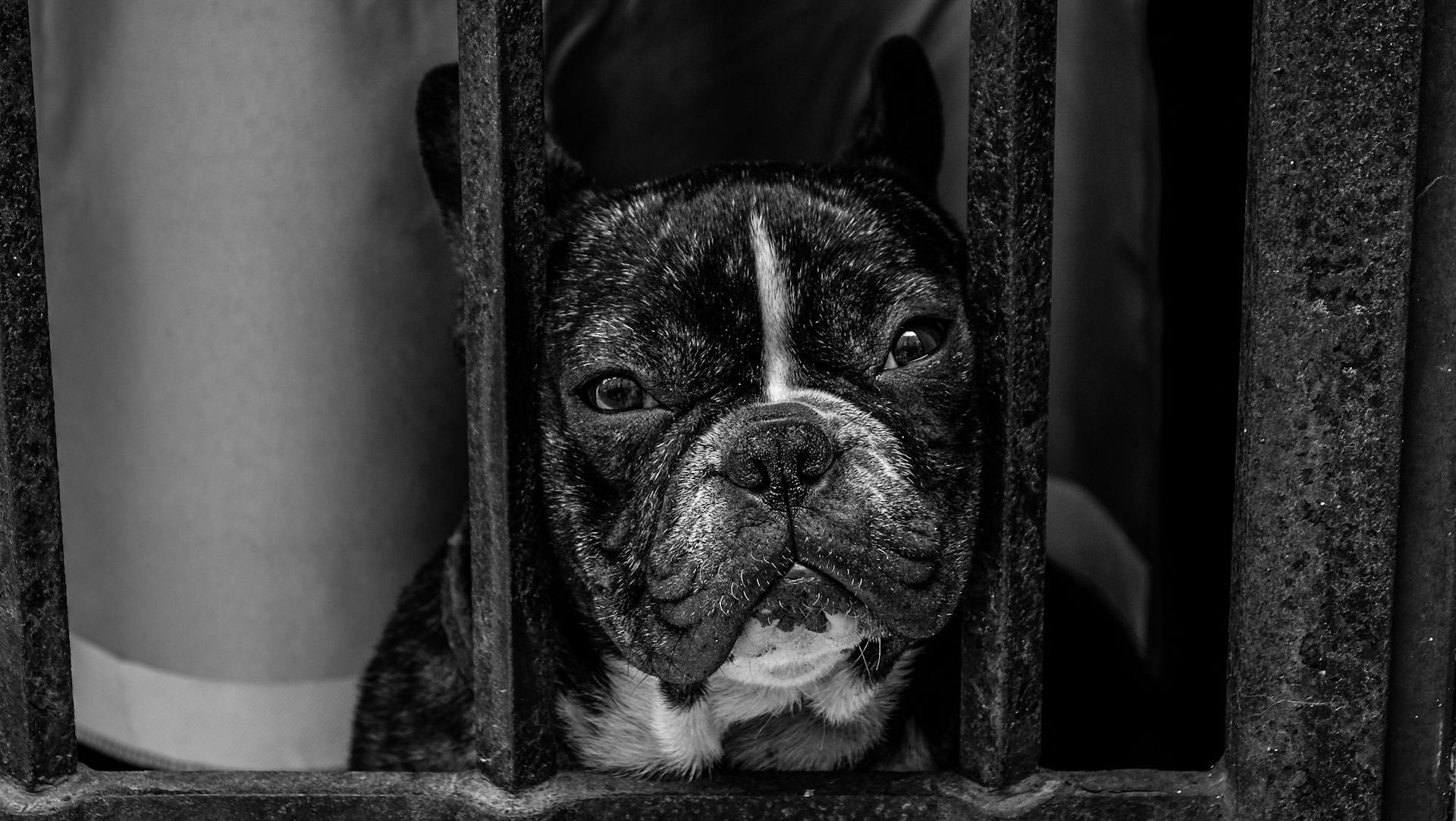
French Bulldogs are known for their adorable underbites and adorable wrinkles, but they're also notorious for their snoring. It's a common trait among the breed, with up to 80% of French Bulldogs experiencing snoring.
French Bulldogs are brachycephalic, meaning they have short, flat faces. This unique facial structure can cause their airways to become narrow and obstructed, leading to snoring.
A study on French Bulldogs found that their snoring is often caused by the relaxation of the muscles in the back of their throat, which can partially block their airways. This can be exacerbated by their short, narrow airways and elongated soft palates.
In addition, French Bulldogs are prone to obesity, which can contribute to their snoring. Excess weight can put pressure on their airways, making it harder for them to breathe and leading to snoring.
Readers also liked: English Bulldog Snoring
Why French Bulldogs Snore
French Bulldogs are notorious snorers, and it's not just because they're adorable. Narrowed nostrils, a common trait in Frenchies, restrict airflow, making it harder for them to breathe, especially through their nose.

Their elongated soft palate can also partially block the airway, causing snoring sounds when they breathe. This is due to their compact skull, which can lead to an overcrowded throat and airway.
Tracheal stenosis, a narrower trachea than usual, can also contribute to respiratory noises. And let's not forget excess weight, which can lead to additional fatty tissues in the throat, exacerbating snoring.
A Frenchie's sleeping position can also impact snoring. Lying on their back, for instance, might intensify the snoring.
Here are the main causes of French Bulldog snoring:
- Narrowed nostrils
- Elongated soft palate
- Tracheal stenosis
- Overweight or obesity
- Sleeping position
Reducing Snoring
French bulldogs are prone to snoring due to their unique physiology, but there are ways to reduce the severity of snoring.
Ensuring your French bulldog maintains a healthy weight is crucial, as obesity can worsen respiratory issues and snoring. Regular exercise can help keep the respiratory system robust and maintain overall health.
Using an ergonomic dog bed or pillow can encourage side-sleeping or elevate their head slightly, reducing the pressure on their airways. This can potentially reduce the intensity of snoring.
Recommended read: Dog Snoring Labrador

Limiting exposure to secondhand smoke is essential, as it can irritate their airways and exacerbate snoring. Keeping your home's humidity level balanced is also important, as a dry or humid environment can affect breathing.
Here are some ways to reduce snoring in your French bulldog:
- Offer an ergonomic dog bed or pillow
- Use air cleaners and frequent cleaning to reduce exposure to potential allergens
- Ensure regular exercise
- Avoid collars that can press on their throat; use harnesses when walking them
- Keep your home’s humidity level balanced
- Ensure they stay hydrated
- Limit exposure to secondhand smoke
- Consult a veterinarian about potential medications or treatments
Maintaining a Healthy French Bulldog
Excessive weight can exacerbate respiratory issues in French Bulldogs, making it essential to keep them on a balanced diet and regular exercise. A healthy weight can help reduce weight-related snoring issues.
If your French Bulldog seems to be struggling to breathe while awake, using their abdominal muscles visibly to inhale or exhale, it could be a sign of respiratory distress. This can be an indication of a more serious health concern.
Regular episodes of coughing, wheezing, or gagging, especially when excited or after light exercise, can be indicators of a respiratory or throat issue. These symptoms can be related to snoring in French Bulldogs.
To keep your French Bulldog healthy, look out for these signs:
- Increased Breathing Effort
- Change in Behavior or Activity Level
- Coughing or Wheezing
- Nasal Discharge or Sneezing
- Changes in Appetite or Weight
- Swollen or Pale Gums
- Restlessness During Sleep
Maintain Healthy Weight

Maintaining a healthy weight is crucial for your French Bulldog's overall well-being, especially when it comes to snoring. Excessive weight can exacerbate respiratory issues, causing your Frenchie to struggle with breathing.
Fat accumulation around the neck and throat area can restrict airflow, making it even harder for them to breathe. Regular exercise and a balanced diet can help reduce weight-related snoring issues.
If your Frenchie seems to be struggling to breathe while awake, using their abdominal muscles visibly to inhale or exhale, it could be a sign of respiratory distress. This can be a serious health concern that requires immediate attention.
A sudden drop in energy, reluctance to exercise, or appearing more lethargic than usual can indicate a health concern that might also be causing the snoring. Keep an eye out for these changes and consult with your veterinarian if you notice any of these symptoms.
Regular episodes of coughing, wheezing, or gagging, especially when excited or after light exercise, can be indicators of a respiratory or throat issue. Nasal discharge, sneezing, or a running nose might suggest allergies or infections that could affect the respiratory system.
A fresh viewpoint: English Bulldog Exercise
Here are some signs to look out for that might indicate your Frenchie is not breathing properly:
- Increased Breathing Effort: struggling to breathe while awake
- Change in Behavior or Activity Level: sudden drop in energy or reluctance to exercise
- Coughing or Wheezing: regular episodes of coughing or wheezing
- Nasal Discharge or Sneezing: consistent nasal discharge or sneezing
- Changes in Appetite or Weight: sudden change in appetite or unexpected weight gain or loss
- Swollen or Pale Gums: pale, blueish, or swollen gums
- Restlessness During Sleep: frequent waking or restlessness during sleep
Check If Your Frenchie Suffers
Your Frenchie's snoring could be a sign of allergies, so check if they're sensitive to dust, dirt, pollen, mould, or mites.
Regularly cleaning and washing your Frenchie's bed is crucial to prevent allergies from flaring up.
If you're a smoker, be aware that your Frenchie can develop asthma, allergies, and other breathing issues if they spend a lot of time in smoky rooms.
Central heating can dry out the air, making it uncomfortable for your Frenchie to breathe, so consider using a humidifier to keep the air moist.
Make sure your Frenchie's sleeping area is smoke-free and well-ventilated to prevent snoring and other breathing issues.
By taking these simple steps, you can help your Frenchie breathe easier and sleep better.
Consider reading: Dog Food for French Bulldogs with Allergies
Sources
- https://pudgybulls.com/do-all-french-bulldogs-snore/
- https://carecharlotte.com/blog/your-french-bulldogs-snoring-is-awfully-cute-or-is-it-bas/
- https://www.frenchbulldogbreed.net/blog/french-bulldog-snoring/
- https://www.arlingtonfrenchies.com/post/why-do-french-bulldogs-snore-or-snort
- https://bulldogstop.medium.com/ten-causes-of-french-bulldog-snoring-33214a628313
Featured Images: pexels.com


